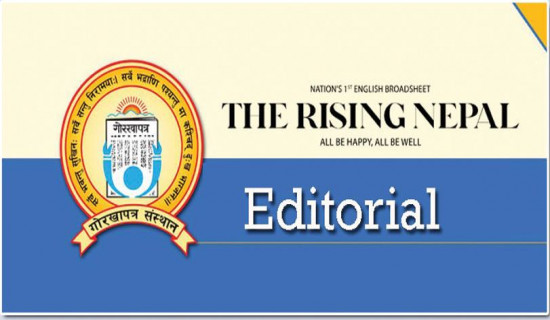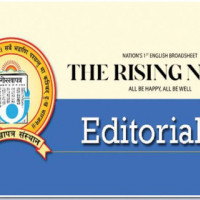- Friday, 31 October 2025
Moving With Confidence
Our constitutional structure has proposed two conditions for securing vote of confidence under the parliamentary procedure. Firstly, Article 100 (1) of the Constitution of Nepal states that the Prime Minister may, whenever he or she considers necessary or appropriate to show that he or she has confidence from the House of Representatives (HoR), table a motion to that effect in the HoR for the vote of confidence. Another provision of the same Article states if the political party which the Prime Minister represents is divided or a political party in coalition government withdraws its supports, the Prime Minister shall seek a motion in the HoR for a vote of confidence within thirty days.
The second condition emerged when two key parties of ruling alliance CPN-UML and Rastriya Prajatantra Party withdrew their support to the incumbent government headed by Pushpa Kamal Dahal Prachanda. Consequently, Prime Minister Prachanda, the other day, secured the vote of confidence, the second time from the House. A total of 172 out of 262 House members present in the meeting voted for the proposal on the vote of confidence to the government presented today at the House meeting by Prime Minister Prachanda. A total of 89 HoR members voted against the proposal while a member stood neutral. The Prime Minister had secured first vote of confidence on January 9.
A special political circumstance led to a situation where constitutionally, the Prime Minister had to show that he had the backing of the MPs to lead the government. But the PM has said that the condition to seek the vote of confidence will not repeat itself immediately again as provoked by the opposition leaders because the present ruling coalition has common agenda to put the government in a comfortable situation to run the executive affairs of the nation. He told the House that the fresh alliance was formed with the promise of political stability and there were no major policy differences between the Prime Minister and the ministers, nor operational snags.
This is the popularly aspired indication that the difference of thoughts, ideologies and egos will not stand on the path of political stability that the nation needs badly. The coalition partners must converge on the priority agenda of the nation and people. In this regard, the PM has the onus of holding all political stakeholders together for smooth functioning of the government. Recalling the meeting of the very first day of the parliament, PM Prachanda gave justification of collapsing the alliance with the CPN-UML. The very sensitive issue of parliament dissolution made an irrelevant entry and it shook the entire country. Raising such topic was not contextual and the move, which caused a major constitutional and political crisis in the country, was not a matter of pride, the PM stated.
Addressing the parliament, the Prime Minister expressed his serious commitment to conclude the peace process and expedite other development works as per the wish of the people. Backing a government now and backing away from the support next moment does not bode well for stability and, as hoped by the Prime Minister, will not make an inauspicious comeback. The confidence vote paves the way for the expansion of the Council of Ministers and creates an environment to concentrate on development and prosperity. Political tussle and instability is the last thing the people want to see at a time when the nation has to come out of the economic problems.

















